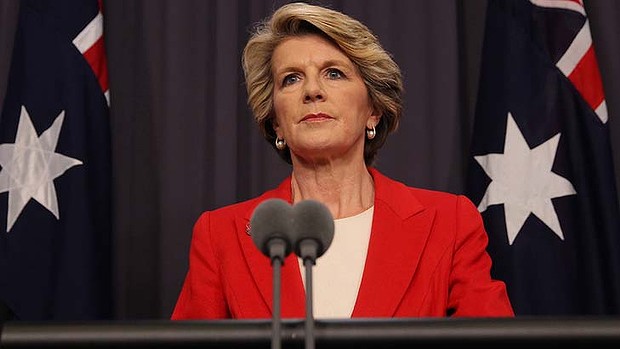
Foreign Affairs Minister Julie Bishop opposes a UN resolution to condust an independent war crimes investigation in Sri Lanka. Photo: Alex Ellinghausen
By Julie Bishop
THE opinion piece by Gordon Weiss (“Stance on Sri Lanka needs urgent rethink”, 4/4) includes a number of assertions that need correction.
Most seriously, Mr Weiss makes the untrue claim that during a visit to Tamil regions in Sri Lanka’s north and north-east just over 12 months ago I was given a guided tour by the Sri Lankan military.
I led a delegation that included Immigration Minister Scott Morrison and Justice Minister Michael Keenan.
A precondition of our visit to the Tamil regions was that we would be driven around by leading members of the Tamil National Alliance.
This took place over more than two days, with no military, government or police accompanying our delegation.
Our Tamil hosts were free to take us to any location of their choice and we were unhindered by any arm of the Sri Lankan government.
This included visits to camps of displaced Tamil villagers, areas in the process of being de-mined, and areas formerly under the control of the Liberation Tigers of Tamil Eelam (LTTE).
For example, we met Tamil community representatives invited by our hosts in Jaffna, villagers in Mullaitivu who had been displaced by a military camp, former LTTE commandos and soldiers, and many Tamil community leaders.
We observed a huge investment in infrastructure, including thousands of kilometres of high-quality sealed roads, new schools and hospitals.
My delegation also observed the struggle to build trust after almost 30 years of one of the world’s most vicious civil wars.
Sri Lanka is emerging from a dark chapter in its history and it will be no easy task to rebuild trust and confidence between all sectors of society.
There are many disturbing events that took place over that time, including during the final stages of the war.
In meetings with Sri Lanka’s political leadership, I have urged them to progress reconciliation as quickly as possible.
This has included the need for the Sri Lankan government to implement all the recommendations of the Lessons Learnt and Reconciliation Commission, demilitarisation of the north and north-east, devolution of some government responsibilities to the Tamil regions, and an independent investigation into allegations of war crimes by both sides in the final stages of the civil war.
It is unrealistic to expect Sri Lanka to achieve full reconciliation quickly, given the terrible events that took place over several decades.
However, nations such as Australia can point to the foundations of a successful multicultural society, which is based on all being equal before the law, freedom of speech, a free media, a robust democracy and tolerance.
The Australian government believes that it is in the interests of all Sri Lankans to engage and encourage the challenging and painful process of reconciliation, rather than seek to isolate and punish.
Mr Weiss’s grandstanding will not make any constructive contribution to that process and risks encouraging remnant members and supporters of the LTTE to cling to a philosophy of violent extremism.
Julie Bishop is the Minister for Foreign Affairs
Courtesy: theherald.com.au

Leave a comment